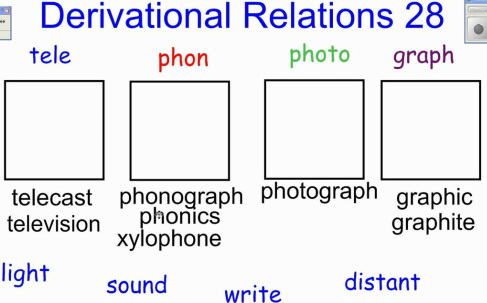Mr. Yorgi's Classroom
Elementary classroom
Tuesday, July 21, 2020
Derivational for ELL learners
The study of cognates is particularly helpful to English learners at this stage. Cognates are words in different languages that share similar structures and similar meanings because they share similar origins. Looking closely at cognates will help the student to see similarities between their native language and the language they are learning.
Derivational stage links/ games
Verbivore(Noun)
One who has an enjoyment of words and wordplay.
Games APPS,
https://www.arkadium.com/
Word Wipe
Out Spell
Scramble word
Derivational Stage work sheet

Monday, July 20, 2020
Derivational Stage
Wednesday, July 8, 2020
Strategies for supporting English Language Learners Syllables and Affixes
- Pronounce the word and use the Spanish equivalent; then have students repeat the word in English several times
- Tap students’ prior knowledge and identify anchor or familiar words for new vocabulary words, e.g., “walk” as the anchor for “saunter”u
- Pre-teach words before students read the material
- Introduce graphic organizers that show relationships among words
- Show real, actual objects, pictures, picture books, and video clips to introduce vocabulary
- Use the Spanish equivalent
- Teach students how to use the structure of words, e.g., compound words, prefixes, roots, and suffixes, to break down a word into the meaningful units
- Define words in context, using sentences from students’ reading material
- Help students find the context clues that will help them determine the meaning of an unknown word as they read
- Use graphic organizers to help students process the content
- Show students how to use the dictionary to confirm their predictions about the meaning of the vocabulary they meet in their reading
- Talk-through the words as students hear these during oral reading
- Use a variety of strategies to help students process the meaning of difficult words
- Focus on a limited number of key words, particularly interrelated words, to increase the depth of their understanding and concept development
- Give students multiple exposures to words throughout the day in order to cement their understanding of the word meanings
- Reinforce new words through activities, discussions, and assignments following students’ reading
- Help make the words meaningful to students by linking the words with familiar things, people, or experiences
- Have students incorporate the new words into students’ writing assignments
- Help students integrate new words into their speaking and writing vocabularies
- Display word walls and other graphic organizers with the new vocabulary and definitions
Apps for Syllables and Affixes Stage
Reading Eggs aims to help young children learn how to read through the fun exploration of different games as they make their journeys through different games. Children learn to read through phonics as they begin the process of learning this important life skill.
Reading Eggs spelling apps for ages 6 to 12 is a fun and motivational way to teach kids how to spell. Each app holds 10 interactive spelling games – each reinforcing a different literacy skill, including proofreading, word endings and plurals, compound words, syllables and much more!
The Reading Eggs spelling apps will boost your child’s confidence with spelling, help expand their vocabulary, and develop their key literacy skills as they progress through an extensive collection of challenging words, spelling activities, and contexts.
Spelling Shed is an exciting spelling game suitable for ages 5 to 11 and focuses on spelling and literacy. This beautifully designed app is built by a team of Primary school teachers. It is built with students, teachers and parents in mind and aims to make spelling fun for students as well as simple for adults to manage. The app supports learning to spell words required by the National Curriculum. Spelling Shed have made their games dyslexia friendly using the 'Open Dyslexic' font.
Kids choose from three stages or reading levels. They can practice spelling or play the Bee Keeper game. The practice rounds have four levels. At the basic level, kids hear the word and see it on screen. They are then given all of the letters, which they have to tap to spell the word. The levels get increasingly difficult and by the end, kids only hear the word before having to spell it. Kids will learn to spell more complex word forms and will start to use dictionaries. There are leaderboards for schools, but not for individuals.
Price: Free to try
Spell Wizards is an engaging spelling app for primary aged children learn to spell while having fun along the way. Spell Wizards is a spelling adventure that encourages learning through play. The app is a fun way to learn spellings. Easy to access and simple to use, Spell Wizards has been designed for children aged 4-11 to improve their spelling, typing and listening skills.
The app supports classroom learning for teachers, using curriculum and custom spelling lists. Accessible online as a web app, Spell Wizards is an effective support tool which can be used by schools, teachers and parents looking to improve spelling confidence for children through play, with the added benefit of being able to track their progress online.
Price: Free



